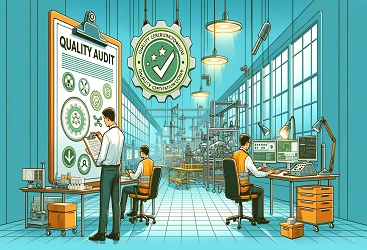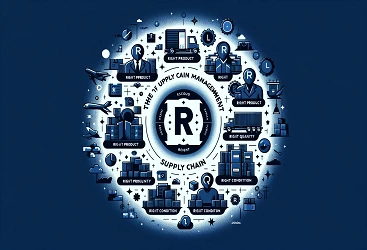What is Quality Audit?
A quality audit is a procedure in which a team of auditors, either internal or external, thoroughly examines a quality system. It is a key component ...
By AMREP | Posted on October 10, 2022
Updated on December 12, 2023

Supply chain management is a complex process that involves managing vendors, inventory, and logistics. To succeed, businesses must know how to streamline processes and optimize performance at every step. An effective supply chain management strategy requires the use of various principles. These best practices help businesses achieve efficiency and reliability in their supply chains by focusing on the big picture instead of individual tasks, setting measurable goals for improvement, and more. These supply chain management principles are proven methods for streamlining your own operation and will help you improve performance in all areas of your business.
Supply Chain Management (SCM) is a set of activities companies perform to deliver products and services from their suppliers to their customers. Supply Chain Management is a wide field covering several different SCM functions. These include logistics management, warehousing, transportation, inventory management, materials management, production management, and quality management. Some SCM functions can be outsourced, but a successful SCM strategy involves keeping some of these functions in-house.
Organizations have adopted an agile approach to reach customers faster with minimal inventory and supply chain management processes in the highly competitive and fast-paced business world. Supply chain management (SCM) is a set of principles that enable businesses to streamline their supply chains and reduce costs by using processes and software to monitor inventory levels, production, shipping, and storage. Here we list down 8 key principles of supply chain management that will help you to streamline your business operations.
Supply chain management professionals must understand the need of the customers. Let's take an example. When customers purchase products from you, it means they are filling their needs. People who purchase your products are resolving a problem or fulfilling a need.
The supply chain manager must understand the customer's problem or demand and ensure that it is met. A company can address it more effectively, quickly, and affordably than a competitor. Categorize the customers into groups and then define their needs. Once you understand the customers' needs, making an effective SCM strategy is just a cup of tea for you.
To keep up, business is rapidly changing; supply chains must learn how to innovate. Companies must continuously improve their processes and find ways to sustain this innovation so they don't fall behind their competition. There are various methodologies for process improvement, such as Lean, Six Sigma, and the Theory of Constraints, which can help with this goal. However, continuous process improvement alone is not enough because new technologies have the potential to disrupt existing sectors completely. This is called disruptive innovation.
Disruptive innovation is a new solution to a customer's problem that completely changes the dominant paradigm. When this happens, the old way of doing things becomes obsolete, and the new way becomes the standard.
If you manufacture automobiles, you need to figure out how to make them better, faster, and cheaper than your competitors while also determining the next paradigm so you know what to design when automobiles are phased out.
Individuals involved in supply chain management cannot work in isolation; they must be willing to collaborate with others both within and outside of their organization. A selfish mentality only results in transactional relationships where people prioritize short-term gains over long-term advantages. This is more costly in the long run and fosters a lack of trust and a reluctance to compromise among supply chain participants.
Because the world is constantly changing, supply chains need to be adaptable to keep up. Flexibility measures how quickly a supply chain can change to meet the market's demands, whether an increase or decrease in sales or even a disruption in the supply. This flexibility is often achieved by having extra capacity, different sources for supplies, and different ways to deliver the product. Usually, being flexible comes at a cost, but it's important to weigh that cost against the benefits to see if it's worth the investment.
Technology has drastically changed how supply chains operate, from when an order is placed to when it arrives at its destination. In the past, people would order items from catalogs and mail in checks, then wait for their deliveries to arrive. Today, we place orders on our phones, pay with our credit cards, and get real-time updates until our deliveries arrive. To be successful in supply chain management, it's essential to understand how technologies work and how to use them to add value at every stage of the supply chain..
The globalization of business has created opportunities and challenges for companies all over the world. As a supply chain manager, you must know how your company is affected by global economic forces and competition. You need to understand how the global economy impacts your company's inputs and outputs, and you also need to be aware of potential competitors worldwide. Understanding the global landscape can you protect and grow your company's interests.
Supply chain management is all about being proactive and aware of potential risks that could disrupt the flow of supplies. While it's important to have stability within the supply chain, it's just as important to have a risk management plan to deal with the unexpected. By having a well-thought-out risk management strategy, and Supplier Performance Evaluation , businesses can take advantage of opportunities during times of uncertainty.
Supply Chain Management (SCM) places great importance on visibility because it understands that you cannot manage what you cannot see. Knowing what is happening in real-time (or near real-time) enables you to make faster and more informed judgments. However, visibility comes at a cost. You must design your supply chain in such a way that it enables you to collect data on critical process steps.
Visibility is valuable because it enables you to make judgments based on facts rather than intuition or ambiguity. With SCM, you can avoid potential problems and disruptions by having all the information you need at your fingertips to make well-informed decisions.
Whether an importer or an exporter, it is important to know the basic principles of supply chain management. Supply chain management isn't just a business strategy; it is a business model that can be applied to any business.
In any business, the responsibility of supply chain management falls on the shoulders of the procurement department. They are responsible for ensuring that the products you need arrive on time and in good condition. They ensure that costs are kept low, and the quality of the goods remains high. They are responsible for a lot, making their job a bit stressful. Contact us and get help from our procurement experts.
Contact Us To See What We Can Do
Call Us
Mon - Sat 9.00 - 18.00
Sunday Closed


21 - September 2023
21
September
2023
A quality audit is a procedure in which a team of auditors, either internal or external, thoroughly examines a quality system. It is a key component ...

14 - October 2022
14
October
2022
Supply chain management (SCM) is the process of planning, measuring, and monitoring the flow of goods and services from the suppliers to the end customer...

19 - March 2022
19
March
2022
AMREP Supplier Management Services is back again working in the Defense Electronics industry. Previously our work was on night vision ...
